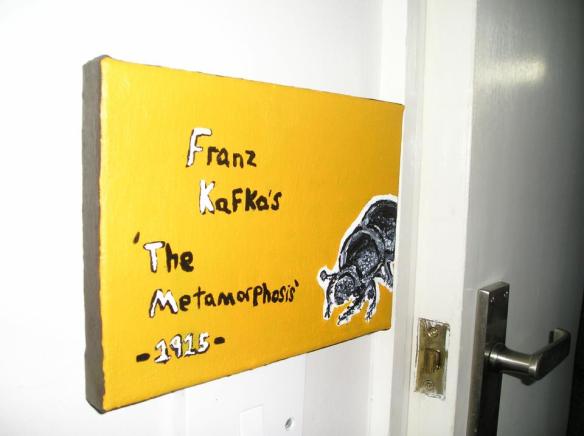My parents recently returned from a visit to Prague, in the Czech Republic, and presented me with a gift of Franz Kafka‘s ‘The Metamorphosis’. It is a beautiful edition of the short novella, wonderfully bound with obvious care taken to present the work in the historical context in which it was wrote. I have a deep fondness for Central Europe, and hope to travel to the Czech Republic myself one day, but this gift helped highlight the literary scene in the early 20th century, before the rug of peace was well and truly ripped from under Europe in 1914.
As I re-read ‘The Metamorphosis’ it became clear that I had not appreciated the tale on a previous read many years ago. The disgust of which Gregor Sama’s family feel about him in the weeks and months after his ‘change’ renders the reader uncomfortable as we learn of Gregor’s own views on his new life climbing walls whilst starvation slowly sets in. Kafka never wanted his ‘vermin’ illustrated and the original edition, published in German in 1915, required careful consideration translation of the language used when it was published in English a few years later. Having finished ‘The Metamorphosis’, I delved back into my book shelf and read a few more of his short stories and excerpts. His work often deals with the themes of alienation, family conflict, isolation and psychological suffering. His substantial works, including ‘The Castle’, ‘The Trial’ and ‘The Judgement’, often deal with the above themes and the roles that are thrust upon the characters. Frustration is borne out of a maddening bureaucracy in ‘The Castle’, possibly influenced by the domination of Kafka’s own all consuming insurance job, whilst family conflict can be found throughout most of his fictional works.
By chance I’m currently reading Albert Camus‘s ‘The Rebel’, a philosophical essay on the role, meaning and context of rebellions throughout the past 300 years. It is a heavy going but enlightening read, and builds upon themes discussed in his previous novels, ‘The Plague’ and ‘The Stranger’ (heavily recommended!). Kafka, it is noted, heavily influenced existentialism, and this is reflected in the works of Camus and his contemporary friend and sparring partner Sartre. (Although it perhaps should be noted Camus is noted more for his opposition to nihilism and his closer links to the philosophy and debating of absurdism).
Influenced by terrible and sad tale of Gregor Samsa, I began a quick little painting portraying an allusion to the ‘vermin’, and the title and publication date of Kafka’s tale.

‘Kafka 1915’, an acrylic and gesso painting on stretched canvas by the author. (Sold! Well given to free to a friend in Belgium).
The tale of Kafka himself is perhaps to throw light onto the dark material that he wrote. Although publishing little during his lifetime, Kafka gained fame relatively soon after his death. Before dying of tuberculosis at the age of 40 in 1924, he ordered his friend Max Brod to burn his remaining unpublished body of literature and letters. Thankfully Brod disobeyed this last demand of his dear friend, and helped publish the short stories, unfinished manuscripts and letters to widespread literary acclaim. A prolific letter writer during his life, Kafka has left behind a substantial amount of letters describing his lifestyle and demonstrating his writing commitment. Lauded by the literary establishment and by the public as a true innovative writer of the early 20th century, Kafka would surely be happy with his status.
- ‘Nightmarish rather than surreal‘, a talk on the works and themes of Kafka by David Foster Wallace. Well worth a listen, as he explains Kafka’s plain and elegant writing style.

